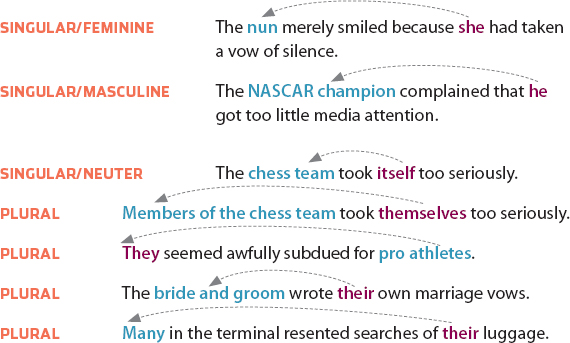Pronoun/Antecedent Agreement
Chapter Opener
57
their or his or hers?
Pronoun/Antecedent Agreement
You already know that pronouns take the place of nouns. Antecedents are the words pronouns refer to. Pronouns share some of the same markers with nouns, such as gender and number.

The basic rule for managing pronouns and antecedents couldn’t be simpler: Make sure pronouns you select have the same number and gender as the words they stand for.
| DRAFT | When a student spends too much time on sorority activities, they may suffer academically. |
| CORRECTED | When a student spends too much time on sorority activities, she may suffer academically. |
As always, though, there are confusing cases and numerous exceptions. The following guidelines can help you avoid common problems.
Check the number of indefinite pronouns. Some of the most common singular indefinite pronouns — especially anybody, everybody, everyone — may seem plural, but they should be treated as singular in academic or formal writing. (For the complete list of indefinite pronouns, see the chart in Chapter 55.)
| DRAFT | Has everybody completed their assignment by now? |
| CORRECTED | Has everybody completed his or her assignment by now? |
If using his or her sounds awkward (and it almost always does), revise the sentence.

Correct sexist pronoun usage. Using either his or her alone (instead of his or her) to refer to an indefinite pronoun can be considered sexist unless the pronoun clearly refers only to males or females. The principle also applies to he and she when the pronouns are similarly exclusionary. (respect your readers) You usually have several options for avoiding sexist usage.
| DRAFT | Don’t trust a driver using her cell phone on the freeway. |
| CORRECTED | Don’t trust a driver using his or her cell phone on the freeway. |
| CORRECTED | Don’t trust drivers using their cell phones on the freeway. |
Treat collective nouns consistently. Collective nouns — such as team, herd, congregation, mob, and so on — can be treated as either singular or plural.
The Roman legion marched until it reached its camp in Gaul.
The Roman legion marched until they reached their camp in Gaul.
Just be consistent and sensible in your usage. Treat a collective noun the same way, as either singular or plural, throughout a paper or project. And don’t hesitate to modify a sentence when even a correct usage sounds awkward.
| AWKWARD | The team smiled as it received its championship jerseys. |
| BETTER | Members of the team smiled as they received their championship jerseys. |